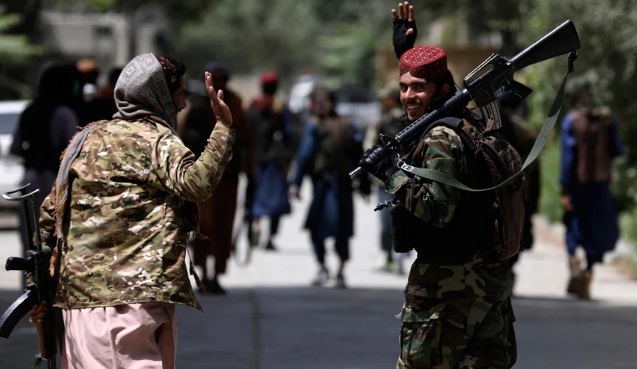The Taliban have seized power in Afghanistan and pledged to improve the economy, but without access to international aid and foreign reserves, the country’s future, one of the world’s poorest, is in jeopardy.
Some countries have already announced the freezing of financial support.
The International Monetary Fund and the World Bank remain silent, but it is likely that they will in turn be forced to freeze financial aid to Afghanistan.
“Afghanistan is heavily dependent on foreign aid,” said Wanda Felbab-Brown, Afghanistan expert at the Brookings Institution, explaining that foreign aid is at least “10 times” higher than the Taliban.
Also Read
- Robbers shot and killed 70-year-old to get her car – Video shocks
- Workers of the UN mission are being evacuated
- IMF and USA freeze funding
In 2020, Afghanistan’s GDP amounted to $ 19.81 billion, while the flow of foreign aid covered 42.9% of GDP, according to the World Bank.
“Afghanistan’s economy is fragile and dependent on foreign aid,” the World Bank said, noting that economic growth and private sector diversification have so far been hampered by insecurity, political instability, institutional weakness, lack of infrastructure, widespread corruption “.
As for Taliban revenues, they are estimated at $ 300 million to $ 1.5 billion, according to a report by the UN Security Council Sanctions Committee, published in 2020, as noted by the French Agency and relayed by Athenian News agency.
Opium, ransom, blackmail and taxes
The Taliban’s income comes mainly from criminal activities, starting with the cultivation of opium, from which opium and heroin are extracted, and, consequently, from the drug trade, but also from blackmailing local businesses and extortion.
Ransom from the abductions.
“Much of their income also comes from tax deductions,” said Charles Kupchan, a Council on Foreign Relations (CFR) expert, stressing that they specialize in taxing everything in the territories they control, from government programs to the goods.
“Afghanistan will no longer be an opium-rich country,” the Taliban spokesman said yesterday, adding that production would “disappear again”, referring to the fact that when they ruled the country in the 1990s and until 2001, The Taliban had banned poppy cultivation.
At present, despite the billions of dollars spent over the years by the international community to eradicate poppy cultivation, Afghanistan accounts for 80% of world opium production.
Hundreds of thousands of jobs depend on opium production in this country hit by unemployment after 40 years of war.
At a time when the economic situation has further deteriorated with the pandemic, the Taliban themselves have acknowledged that improving the economic situation cannot be done without outside help.
“We have had contacts with many countries. “We hope they will help us,” said Zabihullah Mujahid.
“Education decent”
The Taliban now appear to be more favorably received by the 1996-2001 regime. Russia, China and Turkey rushed to welcome the regime’s first public statements. But many donor countries, such as the United States, are keeping their distance.
Washington insists it expects the Taliban to respect the human rights, especially of women.
Canadian Prime Minister Justin Trudeau has said his country does not intend to recognize the Taliban government.
As early as Monday, Berlin announced the cessation of development aid.
Germany, one of the top ten donors to Afghanistan, was to provide 430m euros in aid this year, of which 250 in development aid.
According to the expert on the Council on Foreign Relations, the Taliban have an interest in showing a good image if they want financial aid.
Moreover, China, the world’s second largest economy with strong interests in Afghanistan, will not replace Western countries economically.
“The Chinese are very mercantilist. “They tend to show more interest in countries with favorable trade environments, countries where they can create new silk roads.”
“Are the Chinese settling in Syria? In Iraq? In Lebanon? No. “Therefore, I will not overestimate China’s role in Afghanistan.”
“And this is another reason why I believe the Taliban will try to maintain a good enough image so that they can turn to the international community in the broadest sense.”
It is of great strategic importance that “the assets of the World Bank held by the Afghan government in the United States will not be made available to the Taliban,” a Biden government official has warned.
A foretold humanitarian catastrophe
International aid organizations have warned that millions of Afghans are unable to make ends meet as prolonged drought and resurgence of hostilities have disrupted food supplies in the country affected by the floods.
US foreign troops complete their withdrawal.
Relief organizations are calling for donors to provide resources and humanitarian aid as a matter of urgency, as harvests are expected to be decimated and millions of animals are in danger of extinction as water supplies run out.
Afghan President Ashraf Ghani had warned before fleeing the country before the Taliban occupied Kabul in late June that Afghanistan was facing a severe drought, acknowledging that the national disaster budget was not enough to cover it.
Experts have described the drought as worse for decades.
Without an adequate irrigation system, Afghanistan depends on melting snow to feed rivers and irrigate fields during the summer, and snowfall last winter was very low.
Fahad Said, a climate scientist at Climate Analytics, says the La Niιαa phenomenon and the slowing down of torrents around the globe are likely to be responsible for the extremely dry weather in Afghanistan.
Although it is difficult to link individual events to climate change, scientists agree that global warming due to greenhouse gas emissions is contributing to extreme weather around the world.
“Afghanistan is a good example of climate injustice. “Historically, it has played no role in the chaos of climate change, but it is paying the price.”
Afghanistan is one of 23 countries designated by the United Nations as a “hunger hotspot” in a report published last month, where more than 12 million in a population of 36 million people are experiencing a food crisis. where their next meal will come from.
Most Watched



